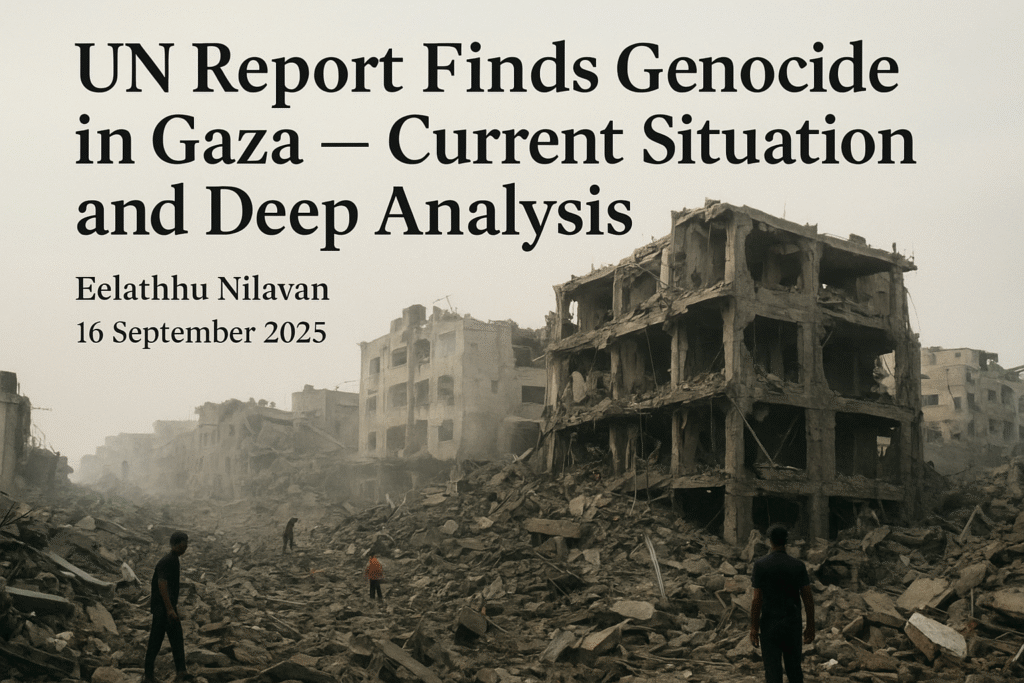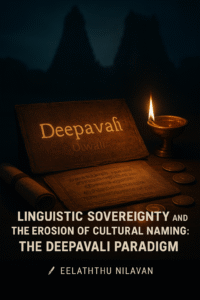✧. Summary
● A new United Nations Commission of Inquiry report concludes that Israel’s actions in Gaza meet four of the five acts defined in the 1948 Genocide Convention, and that statements by senior Israeli leaders can be read as evidence of genocidal intent.

● Israel immediately rejected the report as “distorted and false” and vowed to continue its military campaign, while launching its largest ground assault on Gaza City since the war began.
● The report warns that all states have a legal duty to prevent genocide, and that providing weapons or material support could amount to complicity.
● Gaza is facing a catastrophic humanitarian crisis: mass displacement, thousands killed in bombings, and deaths from famine and acute malnutrition, especially among children.
✦. What the UN Commission says
The three-member Commission (chaired by former UN Human Rights Commissioner Navi Pillay) concluded that Israel has committed four specific acts of genocide under Article II of the Genocide Convention:
➊. Killing members of the group.
➋. Causing serious bodily or mental harm.
➌. Deliberately inflicting conditions of life calculated to destroy the group in whole or in part.
➍. Imposing measures intended to prevent births.
The Commission cites the widespread killing of civilians, destruction of infrastructure, denial of food and medicine, and damage to health and fertility services. It also highlights public statements from top Israeli officials, which, when combined with the actions on the ground, show genocidal intent.
✦. Ground assault and current developments
On 16 September 2025, the Israel Defense Forces (IDF) launched a long-planned ground assault on Gaza City after a night of heavy bombardment. Reports confirmed dozens of civilian deaths within the first hours, with thousands more forced to flee.
Eyewitnesses described horrific scenes. One father said, “We pulled the children out in pieces.” Such testimony underscores the scale of civilian suffering and supports the Commission’s findings.
✦. Israel’s response
Israel’s Foreign Ministry dismissed the report as “distorted and false,” calling the Commission members “Hamas proxies.” Prime Minister Benjamin Netanyahu vowed to continue operations, insisting the military campaign is necessary to destroy Hamas.
US Secretary of State Marco Rubio, during his regional visit, publicly backed Israel’s goal of dismantling Hamas in Gaza, even as humanitarian concerns escalated.
✦. International legal avenues
➊. International Court of Justice (ICJ):
South Africa’s genocide case against Israel is already before the ICJ. The new report provides additional evidence that may influence the Court’s proceedings.
➋. International Criminal Court (ICC):
The ICC is investigating alleged war crimes in Palestine. The Commission’s report strengthens the legal basis for potential indictments of individuals.
➌. Obligations of states:
Under the Genocide Convention, states have a legal duty to prevent and punish genocide. Countries supplying arms or support to Israel may face accusations of complicity.
✦. Evidence — strengths and challenges
Strengths:
● Documented civilian deaths, destruction of homes and hospitals, starvation, and deprivation of essentials.
● Systematic targeting of infrastructure affecting survival and reproduction.
● Official rhetoric suggesting a desire to eliminate Gaza’s population.
Challenges:
● Legally, proving intent to destroy a group “in whole or in part” is extremely difficult.
● Israel maintains it is acting in self-defense against Hamas, not against civilians, and disputes the interpretation of its officials’ statements.
● The Commission’s findings, while authoritative, do not carry the binding force of an ICJ judgment.
✦. Political and humanitarian implications

︎ Diplomatic impact: Some states and civil society groups may demand arms embargoes, sanctions, or suspension of military cooperation with Israel.

︎ Legal momentum: The report adds significant weight to ongoing ICJ and ICC proceedings, shaping future accountability debates.

︎ Humanitarian crisis: The assault on Gaza City worsens already dire conditions. UN agencies warn of acute malnutrition among children and collapsing medical systems.
✦. Conclusion:
The UN Commission’s report is a stark warning: genocide is taking place in Gaza. It places a legal and moral responsibility on all states to act — not only to avoid complicity but to actively prevent further destruction.
Yet geopolitical alliances, security calculations, and political interests may prevent decisive international action. History will record the choices made now — whether the world stood by or acted to stop one of humanity’s gravest crimes.

Written by
Eelaththu Nilavan
Human Rights, Military, Intelligence & Geopolitical Analysis



